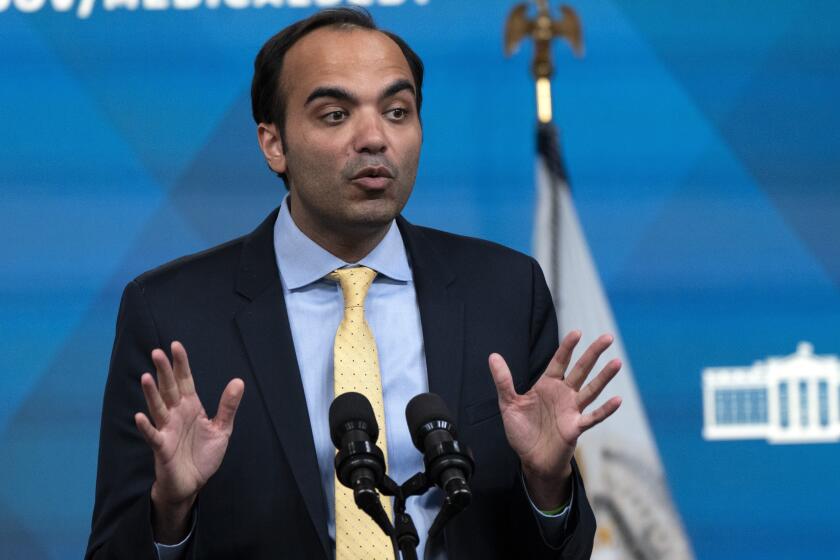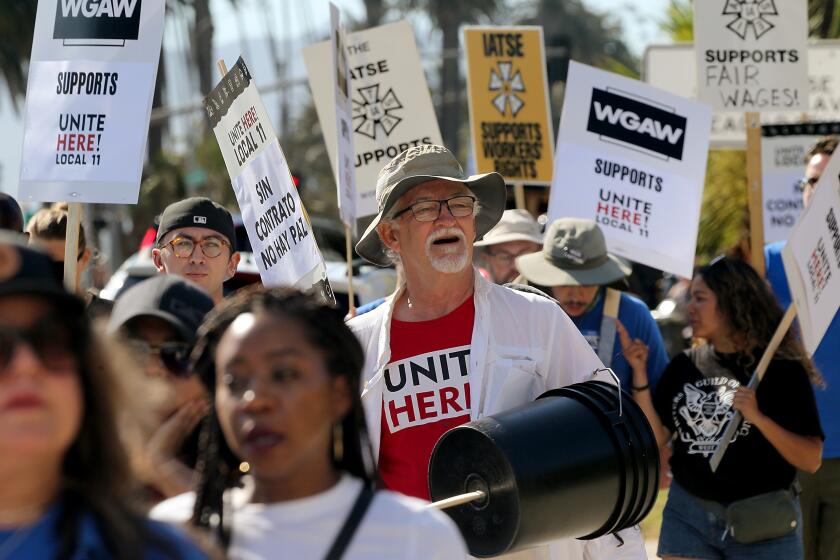Memo Contradicts Wall’s Statements on Lincoln : Thrifts: An aide warned almost a year before the S&L; went under that the bank board’s efforts to control it would be hopeless.
A key federal regulator warned top government officials nearly a year before the collapse of Lincoln Savings & Loan that their efforts to control the Irvine thrift would prove to be a “fiasco,” according to an internal memo obtained by congressional investigators.
The memo appears to contradict recent statements by M. Danny Wall, the nation’s top savings and loan regulator, that his Washington staff was unanimous in its support of efforts to contain the mounting problems at Lincoln--efforts that critics now characterize as hopelessly inadequate.
The high-flying thrift finally was seized by the government last April 14 and the estimated $2 billion cost of making good on its taxpayer-insured deposits would make it the most expensive thrift failure on record.
Wall heads the Office of Thrift Supervision, the successor agency to the Federal Home Loan Bank Board, and is battling to retain his position under heavy criticism from Congress. President Bush has indicated that Wall will be asked to resign if it is proven that regulators were partly to blame for the savings and loan crisis.
The previously undisclosed memo from Kevin O’Connell, a bank board supervisory agent in charge of Lincoln, is among a number of documents obtained recently by the House Banking, Finance and Urban Affairs Committee.
Together, the documents provide new evidence that Washington regulators were divided in 1987 and 1988 over how to deal with growing evidence of alleged fraud and mismanagement by Lincoln’s owner, Charles H. Keating Jr.
Critics claim that the Washington officials could have prevented Lincoln’s collapse if they had followed a recommendation by regional regulators in San Francisco to seize the Orange County thrift in 1987.
Instead of taking control of Lincoln at that time, the Washington regulators negotiated a “memorandum of understanding” with Lincoln in which the thrift promised to refrain from certain practices opposed by the government.
According to O’Connell’s May 24, 1988, memo, the young bank board official had warned his superiors four days earlier that the memorandum of understanding they were signing with Lincoln on that day was “a fiasco.”
O’Connell said in the document that the memorandum of understanding would permit the thrift to argue that it had resolved many legal issues with the board that were, in fact, not resolved by their negotiations.
O’Connell also indicated that the wording of the agreement was improper because it could be used by Lincoln to impede ongoing investigations by the Securities and Exchange Commission and the Justice Department.
He said that regulators had learned only one day before signing the agreement that the Justice Department was pursuing an investigation of Lincoln.
In fact, just four days after the agreement was signed, Lincoln told the New York Times that the agreement had precluded any government effort to force the thrift to take almost $150 million in losses on questionable loans. The loans were at issue in the SEC investigation of Lincoln.
O’Connell said in his memo that Lincoln’s public statements were “adding credence” to his judgment that the memorandum of understanding was a disaster for the bank board.
The memo appears to support the assertion of SEC Chairman Richard C. Breeden last week that the bank board knowingly undercut his agency’s investigation of Lincoln by agreeing to the 1988 memorandum of understanding. Wall has denied Breeden’s contention.
O’Connell, whose father, Bill, was an official of the U.S. League of Savings Institutions, was eventually relieved of his role in the Lincoln case after the thrift accused him of “a clear conflict of interest.” The charge was based on criticism of Keating by O’Connell’s father.
In his testimony before the House committee Tuesday, Wall defended the memorandum of understanding on grounds that it opened the way for a team of examiners to study Lincoln’s books and that examination eventually led to stronger government action against the thrift.
The documents obtained by the Banking Committee include other material that appears to contradict Wall’s claim that his advisers were unanimously opposed to taking tougher action against Lincoln in 1987 and 1988. Among them:
- The report of a “peer review team” that visited the offices of the San Francisco regional regulators in early 1988. It concluded: “It seems imperative that someone intercede . . . to immediately stop unsafe and unsound practices and to provide for close and constant monitoring of Lincoln.”
- A memo written in July, 1987, by William L. Robertson, director of the bank board’s office of regulatory policy, oversight and supervision, citing Lincoln with 19 separate violations of federal thrift regulations.
- A memo written in February, 1988, by Darrel W. Dochow, whom Wall appointed to assume Robertson’s duties, estimating that Lincoln would be posting losses no later than 1990. He also said his office had been unable to identify any “hostile” act by the San Francisco regulators against Lincoln, as Keating had alleged.
Wall contends that his failure to act sooner against Lincoln had nothing to do with pressure from Keating or members of Congress who had received sizable campaign contributions from Keating and his associates. Wall and Keating met privately three times while the board was investigating Lincoln.
Five members of the Senate--Alan Cranston (D-Calif.), John McCain (R-Ariz.), Dennis DeConcini (D-Ariz.), John H. Glenn Jr. (D-Ohio) and Donald W. Riegle Jr. (D-Mich.)--are being investigated by the Senate Ethics Committee for their efforts on behalf of Lincoln.
Documents obtained by the House committee demonstrate that Keating was not only dogged in his efforts to influence regulators, he also had a flair for the dramatic.
“I’m going to be bankrupted,” he declared in one telephone conversation, according to Wall’s handwritten notes. And again, when Keating called for an appointment with Wall in early 1988 to discuss the sale of Lincoln, the regulator made a note that the flamboyant businessman wanted to discuss the “culmination of my life--maybe my fortune.”
KEATING’S POLITICAL CONTRIBUTIONS:Lincoln’s owner, his family and his business empire donated almost $350,000 to political campaigns over a two-year period. A3






